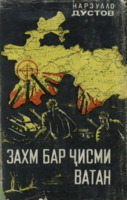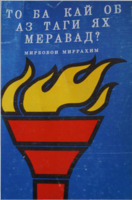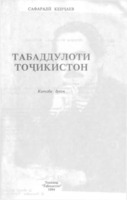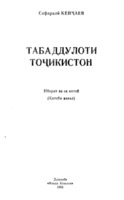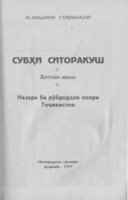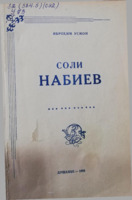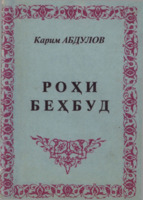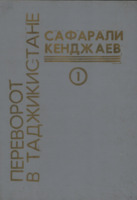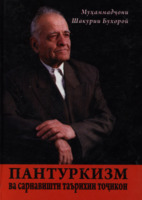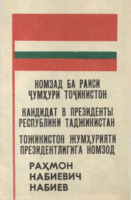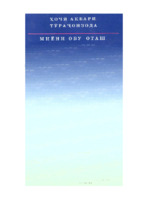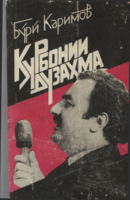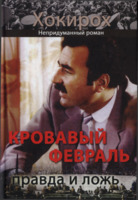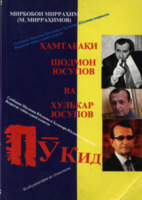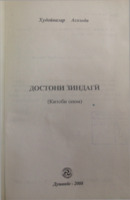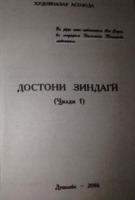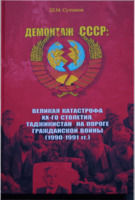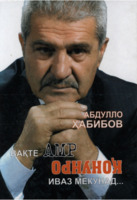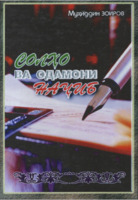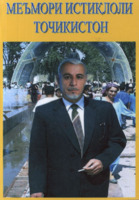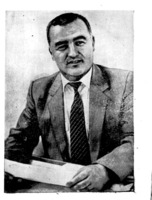Browse Documents (21 total)
Захм бар ҷисми ватан A Wound in the Body of the Nation
From the publisher: Ноиби собик, раиси чумхур Нарзулло Дӯстов яке аз рохбарони содиқ, хирадманд ва фидокори Тоҷикистон аст, ки барон муҳофизати хукумати копунии чумҳуриамон чонбозихои зиёд кардааст. Даврае буд, ки Н. Дӯстов хамчун фарди дарачаи авпали давлат бо зумрае аз хамсафони бовафои худ барон оримию осудагии чомиа ва халк кору пайкор ме намуд. Хафтуми майи соли 1992 байни рохбарони оппозиция ва хукумати конунй ду протоколи «созиш» ба имзо расид, ки дар асоси он хукумати ба ном муросои милли таъсис ёфт. Хамин тавр дар Точикистон табаддулоти давлатй ба амал омад. Депутати халки чумҳурӣ Н. Дӯстов дар бораи ин вокеахо дар китоби худ «Захм бар чисми Ватан» батафсил накл кардааст.
Narzullo Dustov (1940 - ) was largely unknown until he was chosen in November 1991 as Rahmon Nabiev's vice-presidential candidate. Dustov remained vice president until May 1992, when he was forced to resign, whereupon he joined the pro-government "People's Front" in the Tajik Civil War. This memoir is focused on the civil war and the events leading up to it, with some comment on Dustov's life before becoming vice president as well.
То ба кай об аз таги ях меравад? How Long will the Water Keep Flowing Under the Ice?
From the publisher: Ман сулоли "То ба кай об аз таги ях меравад?"-ро баъд аз дахуним сол такрор мекунам ва боз рӯ ба ҷомеа меорам. Ин мақолаҳо натиҷаи заҳматҳои хоксоронаи муаллиф дар роҳи худшиносии милиӣ мебошад. Ҳар яке аз онҳо боиси баҳсу вокунише дар ҷомаи Ҷумҳурӣ қарор гирифтаанд ва гувохи онанд, ки ин талошҳо дар роҳи Озодӣ ва Истиқлоли кишвар фаро расид.
Mirboboi Mirrahim (Mirbobo MIrrahimov) is a translator and expert in pre-Islamic religions. During perestroika, he became famous for his writings on the Tajik language and was one of the first writers to publicly discuss the status of Samarqand and Bukhara. He also became one of the cofounders of Rastokhez, Tajikistan's first independent political organization. This memoir, published during Mirrahim's exile in Iran, reprints a series of his articles, along with commentary and critique of the work of others.
Табаддулоти Тоҷикистон: Иборат аз се китоб (қ. 2)
A Coup in Tajikistan (3 vols.)
Safarali Kenjaev (1942-1999) was a Soviet-era lawyer and prosecutor who rose to prominence in 1990-1991 as a critical voice in the Tajik Supreme Soviet and later as Chairman of the Supreme Soviet in 1991-1992. During the Tajik Civil War, Kenjaev became a leader of the pro-government "People's Front" that retook Dushanbe from the opposition in October-December 1992. This is volume two of Safarali Kenjaev's extended memoir about the collapse of the USSR and the Tajik Civil War.
Табаддулоти Тоҷикистон: Иборат аз се китоб
A Coup in Tajikistan (3 vols.)
From the publisher: Китоби Табаддулоти Тоҷикистон бозгуйи бисёр талхи қисматсӯзи давлату миллати тоҷикон аст, ки аз назари собиқ Раиси Шурои Олӣ ба риштаи тасвир расида.
Safarali Kenjaev (1942-1999) was a Soviet-era lawyer and prosecutor who rose to prominence in 1990-1991 as a critical voice in the Tajik Supreme Soviet and later as Chairman of the Supreme Soviet in 1991-1992. During the Tajik Civil War, Kenjaev became a leader of the pro-government "People's Front" that retook Dushanbe from the opposition in October-December 1992. This is an expanded 3 volume edition of the memoirs of Safarali Kenjaev (1942-1995), a Soviet-era prosecutor who rose to prominence and the position of Chairman of the Tajik Supreme Soviet during the Soviet collapse. In 1992 he became one of the leaders of the pro-government "People's Front" during the Tajik Civil War. This expanded memoir is focused on the civil war, although it includes events preceding the war as well.
Safarali Kenjaev (1942-1999) was a Soviet-era lawyer and prosecutor who rose to prominence in 1990-1991 as a critical voice in the Tajik Supreme Soviet and later as Chairman of the Supreme Soviet in 1991-1992. During the Tajik Civil War, Kenjaev became a leader of the pro-government "People's Front" that retook Dushanbe from the opposition in October-December 1992. This is an expanded 3 volume edition of the memoirs of Safarali Kenjaev (1942-1995), a Soviet-era prosecutor who rose to prominence and the position of Chairman of the Tajik Supreme Soviet during the Soviet collapse. In 1992 he became one of the leaders of the pro-government "People's Front" during the Tajik Civil War. This expanded memoir is focused on the civil war, although it includes events preceding the war as well.
Субҳи ситоракуш The Dawn That Puts Out the Stars
From the publisher: Хулоса, таҳлил ва натиҷабардориҳои муаллиф аз воқеъаҳои охири Тоҷикистон. Ин китоб барои оммаи васеъи хонандагон, хусусан сиёсат-мадорон, таърихнависон ва барои онҳое, ки дар роҳи маърифати худшиносии милиӣ мекушанд, навишта шудааст.
Asliddin Sohibnazar (1939 - ?) was a Soviet-era economist who worked in the Tajik SSR's planning agencies. During perestroika he became an opposition politician, and in 1991 was Davlat Khudonazarov's vice-presidential candidate. This memoir describes the last years of the USSR and Sohibnazar's time in politics, as well asides that extend forward and backwards in time.
Соли Набиев The Year of Nabiev
Ibrahim Usmonov (1948-) is a professional journalist and professor of journalism; in 1991 he became one of Rahmon Nabiev's close advisors. His memoir is dedicated to the approximately one year of Nabiev's presidency, from November 1991 to November 1992.
Роҳи беҳбуд The path of improvement
From the publisher: «Рохи бехбуд» манмӯаи хотирот ва маколоти ҷомеашинос, иқтисоддон ва олими шинохтаи тоник - профессор Карим Абдулов мебошад.
Karim Abdulov (1939-2010) was a Komsomol and Tajik Communist Party functionary in the 1970s and 1980s. As a protege of Rahmon Nabiev, he was forced out of the Tajik Party apparatus in 1988, whereupon he took up an academic career. His memoir covers his years in the Tajik Communist Party leadership, as well as the events of perestroika.
Переворот в Таджикистане
A Coup in Tajikistan
From the publisher: Автором книги «Переворот в Таджикистане» является бывший председатель Верховного Совета Республики Таджикистан Сафарали Кенджаев. В ней освещается одна из трагических страниц — трагедия, пережитая таджикским народом в результате гражданской войны. Автор стремится раскрыть причины и последствия происшедших событии, показывает истинных виновников этой трагедии таджикского народа — исламских экстремистов, религиозных фанатиков и людей, поверивших их пропаганде. Книга рассчитана на широкий круг читателей.
Safarali Kenjaev (1942-1999) was a Soviet-era lawyer and prosecutor who rose to prominence in 1990-1991 as a critical voice in the Tajik Supreme Soviet and later as Chairman of the Supreme Soviet in 1991-1992. During the Tajik Civil War, Kenjaev became a leader of the pro-government "People's Front" that retook Dushanbe from the opposition in October-December 1992. This memoir is focused on the period of the civil war and the year that preceeded it, with some attention given to earlier events.
Пантуркизм ва сарнавишти таръихии Тоҷикистон
Panturkism and the Rewriting of Tajik History
From the publisher: Китоби нави олими маъруф, академик Муҳаммадҷони Шакурии Бухороӣ «Пантуркизм ва сарнавишти таърихии тоҷикон» рисолаи «Фитнаи инқилоб дар Бухоро» ва силсиланигоштаҳои солҳои гуногуни муаллифро дар бар мегирад, ки посухест ба даъвоҳои бузургманишии олимону адибон, сиёсатмадорону фарҳангиёни туркгаро ва таҳрифгарони забону адабиёт ва таърихи фарҳанги тољик дар давраҳои гуногуни замони шуравӣ.
Muhammadjon Shakuri (Shakurov) (1924-2012) was a Tajik philologist and academician. He studied at the pedagogical institute in Dushanbe and later earned his kandidatskaia and doktorskaia degrees at the Institute of World Literature in Moscow. His professional home, however, remained the Rudaki Institute of Language and Literature in Dushanbe. In the late 1980s he became a leading figure in the campaign for the primacy of the Tajik language. This memoir revisits episodes from the late Soviet period related to perestroika and the reconsideration of the Soviet past, including the status of Samarqand and Bukhara. It also reproduces contemporary documents.
Номзад ба раиси ҷумҳури Тоҷикистон Candidate for the leader of the Republic of Tajikistan
Rahmon Nabiev (1930-1993) was a Tajik governemnt official and political. This is a campaign brochure produced by the supporters of Rahmon Nabiev as part of his campaign for President of the Republic of Tajikistan in November 1991. It includes a brief biographical sketch, as well as a description of Nabiev's policies.
Миёни обу оташ Between Water and Fire
From the publisher: Ин китоб хотироти муҷаз ва мухтасари Қозидомулло‐Ҳоҷӣ Акбари Тураҷонзода фақат аз боби воқеаҳои асосии пойиз (тирамоҳ)‐и соли 1991 ва баҳори соли 1992 то таъсиси Ҳукумати Муросои Миллӣ дар Тоҷикистон мебошад. Муаллиф бо самимият ва ошкоро аз ҳаводиси шуми он солҳо ва чеҳраҳои ҳақиқии коргардонҳои аслии гирдиҳамоиҳои Майдонҳои Шаҳидон ва Озодӣ парда бармедорад.
Hoji Akbar Turajonzoda (1954- ) was the influential "Qazi Kalon" or Chief Mufti of the Tajik SSR during perestroika. In 1991 and 1992 he sided with the opposition forces challenging Rahmon Nabiev's government; this short memoir covers the period of time between fall 1991 and the spring of 1992.
Курбонии дузахма
Victim of the Double Blow
From the publisher: Бӯрӣ Каримови на факат дар Точикистон, балки дар собиқ Иттиҳоди Шӯравй машҳур дар ин китоб дойр ба сабабу окибатқои ҳодисаҳои баҳманмоқ, дасисабозию нотавонбинии баъзе аз хукуматдорон, чй туна сурат гирифтанн се пленуми хизби коммунист дар он рӯзҳо бо дарду алам ва дар айни замон бо мухокимаронии мантикан солим кисса пардохтааст. Балки ин китоб сарнавишти пурмочарои худи ӯ ва халқи ӯст.
Buri Karimov (1958-) was a government minister in the Tajik SSR in the mid to late 1980s, reaching the post of Chairman of the State Planning Committee (Gosplan Tajik SSR) by 1989. Famous for becoming the youngest minister in the USSR at age 28 in 1987, Buri Karimov was an ambitious and charismatic late Soviet Tajik politician. He reached the post of republican Gosplan chairman in 1989, but fell out of favor and lost his Party and government positions in 1990 as a result of the February 1990 riots in Dushanbe. This memoir partly describes his political career before and after 1990, but is largely focused on the riots themselves.
Кровавый февраль
Bloody February
From the publisher: В этой книге речь пойдет о причинах и последствиях кровавых событий февраля 1990 года в Душанбе, о трех пленумах ЦК Компартии Таджикистана, которые прошли один за другим и не ответили на вопросы народа, и о том, как тяжело расставался с властью триумвират таджикских руководителей и как подстрелили они на взлете одного молодого и перспективного члена правительства. Автор попытался максимально достоверно исследовать причины, приведшие к чудовищной народной трагедии, и понять, почему все-таки случилось так, что ее кровавые плоды не стали уроком для будущего. Книга приурочена к 25-летию трагических событий и посвящена невинно погибшим в этой необъявленной войне с собственным населением.
Buri Karimov (1958-) was a government minister in the Tajik SSR in the mid to late 1980s, reaching the post of Chairman of the State Planning Committee (Gosplan Tajik SSR) by 1989. Famous for becoming the youngest minister in the USSR at age 28 in 1987, Buri Karimov was an ambitious and charismatic late Soviet Tajik politician. He reached the post of republican Gosplan chairman in 1989, but fell out of favor and lost his Party and government positions in 1990 as a result of the February 1990 riots in Dushanbe. He became famous for his involvement in the "February riots," which almost toppled the leadership of the republic. This memoir is exclusively focused on those events and provides extensive detail on Karimov's side of the story.
Ҳамтабаки Шодмон Юсупов ва Хулькар Юсупов ПӮКИД.
The Union of Shodmon Yusuf and Khulkar Yusupov has come Undone
From the publisher: Ҳеҷ гоҳ бо чунин дилгарми дар навиштани посухе capгарм нашуда будам, чуноне ки дар як моҳи пас аз Наврӯзи соли 2011. Зеро ҳамин даҳ-понздаҳ соли ахир чандин китоб ва садҳо мақола дар мукобили андеша ва шахсияти Мирбобои Мирраҳим (Мирраҳимов) ба нашр расида, ки аксари онҳо қобили накд ва посух нестанд, аммо дурӯғпароканӣ ва тӯҳматномаи С. Мирзорахматов аз ҷинси дигар аст. Дар мавриди навиштаҳои С. Мирзорахматов метавон танҳо бо ибораи хеле зебои Ибни Ҳуққал (Ҳавқал) ифодаи матлаб кард, ки барҳақ дар сурату сирати ин қабил бузургворон мефармояд: «ишон пойбанд ба фазоили ахлоқӣ нестанд ва дар касби разоил бисёр ҳарисанд». Ба ҳар ҳол дурӯғпароканиҳои ҷаноби С. Мирзорахматов, боне шуд, ки дар посухҳо бо бурҳони қотеъ парда аз чеҳраи ҳақиқии он кас бардошта, шахсияти яке аз коргардонони асосии фоҷиаҳои хунини моҳи феврали соли 1990 барои касби мақоми аввал дар Тоҷикистонро дақиқ нишон дода, бисёр дигар иттилоот ва далелҳо дар боби таърихи худшиносии миллии тоҷикон ва умуман таърихи навин мисол оварда шавад, ки то ба ҳол аксарият аз онҳо огоҳ набуданд ва ё бархе аз таре ва барқасд аз онҳо иҷтиноб меварзиданд...
Mirboboi Mirrahim (Mirbobo MIrrahimov) is a translator and expert in pre-Islamic religions. During perestroika, he became famous for his writings on the Tajik language and was one of the first writers to publicly discuss the status of Samarqand and Bukhara. He also became one of the cofounders of Rastokhez, Tajikistan's first independent political organization.et and writer; during perestroika he was one of the founders of Rastokhez, Tajikistan's first independent political organization. He later was involved in the brief opposition-led government that controlled Dushanbe between May and November 1992. This work comprises a combination of memoir-like sketches of the late 1980s and early 1990s, as well as polemics directed at those rival politicians and authors that Mirrahim believes to have misrepresented fact in their own published works.
Mirboboi Mirrahim (Mirbobo MIrrahimov) is a translator and expert in pre-Islamic religions. During perestroika, he became famous for his writings on the Tajik language and was one of the first writers to publicly discuss the status of Samarqand and Bukhara. He also became one of the cofounders of Rastokhez, Tajikistan's first independent political organization.et and writer; during perestroika he was one of the founders of Rastokhez, Tajikistan's first independent political organization. He later was involved in the brief opposition-led government that controlled Dushanbe between May and November 1992. This work comprises a combination of memoir-like sketches of the late 1980s and early 1990s, as well as polemics directed at those rival politicians and authors that Mirrahim believes to have misrepresented fact in their own published works.
Достони зиндагӣ (қ 3.) Stories of life (volume 3)
From the publisher: Дар ҷилди сеюм «Достони зиндагӣ» хотираҳои давраи донишгоҳи муаллиф бо сабки равону дилчасп қаламдод шудаанд. Дар ин китоб хонанда бо воқеаҳои сиёсивӯ фарҳангӣ ва иҷтимоии даҳ соли охири асри XX ва як қатор чеҳраҳои хотирмони ин солҳои пурошӯб ошно мегардад.
H. Asozoda (1941-2014) was a prominent literary historian and educator who served two tours as an interpreter in Afghanistan. This is the third volume of H. Asozoda's three volume memoir. It covers the post-Soviet period and the civil war.
Достони зиндагӣ (қ. 1) Stories of life
From the publisher: Доктори илмиу филология профессор X. Асозода дар ҷилди якуми китоби хотироти худ ҳаёти тифливу наврасӣ, солҳои донишчуи аввалин қадамҳои дар ҷодаи илму маориф гузоштаи хешро бо забони шево ба риштаи тасвир кашидааст. Мутолиаи китоб барои доираи восеи хонандогон алалхусус барои онҳое ки омузиши ҳаёт ва эҷодиёт чеҳраҳои шинохтаи фарҳангиро пешаи худ қарор доданд, судманд хоҳад буд.
H. Asozoda (1941-2014) was a prominent literary historian and educator who served two tours as an interpreter in Afghanistan. This is the first volume of H. Asozoda's three volume memoirs. It covers his childhood, schooling in Kulob, studies in Dushanbe, and his graduate work. It is particularly useful for its description of university life in the 1960s, and the perspective it offers on the contrast between life in more provincial cities and in the capital.
H. Asozoda (1941-2014) was a prominent literary historian and educator who served two tours as an interpreter in Afghanistan. This is the first volume of H. Asozoda's three volume memoirs. It covers his childhood, schooling in Kulob, studies in Dushanbe, and his graduate work. It is particularly useful for its description of university life in the 1960s, and the perspective it offers on the contrast between life in more provincial cities and in the capital.
Демонтаж СССР The Demolition of the USSR
From the publisher: Эта книга о пережитом, о социальной драме, разыгравшейся 20 лет тому назад в Таджикистане, о природе так называемого таджикского ГКЧП, ставшего причиной неистовой антикоммунистической истерии демократов и исламских фундаменталистов, представляющих уникальный симбиоз новой объединённой оппозиции. Эта монография - размышления о трагической судьбе великой державы, неразрывной частью был Таджикистан, переставший существовать в силу двурушничества, предательства, измены, деструктивной деятельности части национальной интеллигенции.
Shukur Sultanov (1932- ) is a historian, and former deputy director of the Institute of Party History of the Communist Party of Tajikistan. In the late 1980s, he was also Minister of Higher Education of the Tajik SSR. This work is a mix of memoir and historical discourse, covering the 1980s and the collapse of the USSR.
Вақте амр қонунро иваз мекунад. The Times When Life Changes Law
From the publisher: Дар ин китоб мақола ва мусоҳибаҳои матбуотии Ҳабибов Абдулло Ҳабибович гирд омадаанд, ки хонандаро бо воқеияти таърихи на чандон дури ҳаёти ҷомеаи Тоҷикистон ошно мекунанд.
Abdullo Habibov (1940-) was a Soviet Party worker, educated in Tajikistan and in Moscow, where he attended the Academy of Social Sciences of the CC CPSU and received the degree of Candidate of Historical Sciences. In the 1980s he was appointed the head of the "Political Section" of the Tajik Ministry of the Interior. He later came to prominence during the February 1990 riots in Dushanbe, when he supported Buri Karimov and the massed protestors. This volume collects a series of his writings about the late Soviet period and a number of explicatory interviews.
Солҳо ва одамони наҷиб. (аз дафтари хотира). Interesting times and interesting people
Muhiddin Zoirov (1931-2018) was a Tajikistani Party and government official. Originally from the village of Laqqon in Badakhshan, he studied agriculture in Dushanbe before embarking on a Party career that saw him rise to the post of Minister of Agriculture of the Tajik SSR and First Secretary of Gorno-Badakshan party organization. This volume collects his thoughts on various state and Party figures he encountered in his career, including Jabbor Rasulov, Abdulahad Kakhorov, as well as many local officials, farm managers, and others. The volume includes over 40 pages of photographs from the author's collection.
Меъмори истиқлоли Тоҷикистон Architect of Tajikistan's Independence
From the publisher: Хонандаи гиромӣ, китобе, ки дар даст дорӣ, маҷмӯаест, аз навиштаҳои донишмандон ва журналистони шинохтаи кишвар аз рӯзгор ва пайкори шахсияти мубориз ва донишманду маорифпарвари машҳур Тоҳири Абдуцаббор, ки ба ҳангоми беморӣ ва даргузашти ин абармарди Тоҷикистон бунёдгузори эҳёи истиқлол ва мақоми расмии забони форсим тоҷикй дар замони нав ба табъ расидааст. Хамчунин дар ин маҷмӯа чанде аз навиштаҳои ин донишманд барои нахустин бор дар шакли маҷмӯа ба дам оварда шудааст.
Tohir Abdujabbor (1946-2009) is best known as the founder of Rastokhez (Rebirth), the first independent political organization in Tajikistan, which campaigned for the primacy of the Taiik language, greater political and economic autonomy and, eventually, independence. Abdujabbor trained as an economist, earning his kandidatskaia degree at the Institute of Oriental Studies in Moscow with a dissertation on Pakistan; he later served as an economic adviser and translator in Afghanistan. During the civil war he fled first to Tehran, later settling in Bishkek before returning to Tajikistan in 2005. Unfortunately, he did not leave behind any memoirs. This volume includes some insightful reminiscences about Abdujabbor by his former colleagues and associates, as well as some his key writings from the late Soviet period and beyond.
Таркиш The Explosion
From the publisher: Яке аз ходимони барҷастаи сиёсӣ ва давлатӣ Ҳоҷи Ҳикматулло Насреддин (Насреддинов) китоби хотироти худро “Таркиш” номгузорӣ кардааст. Китоб марҳалаҳои гуногуни кору мушоҳидаҳои муаллифро дар сохтори ҳизбию давлатӣ ва тариқи роҳбариро дар ҷумҳурӣ дарбар мегирад.
Hikmatullo Nasreddinov (1939-) was a leading Tajik politician in the early 1980s and a protege of Rahmon Nabiev, the First Secretary of the Communist Party of Tajikistan from 1982 to 1985. Nasreddinov's memoir touches on the 1970s and early 1980s, but is largely focused on the final years of the USSR and the start of the Tajik Civil War in 1992, which he blames on the political course taken by Kahhor Mahkamov in the late 1980s.
